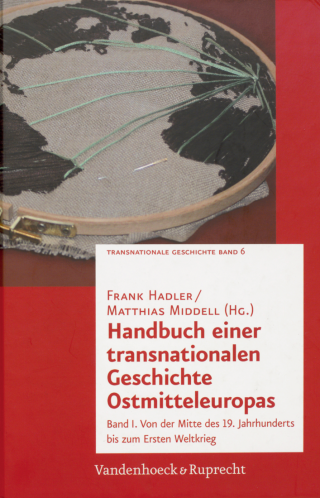
Volume I was published in 2017 and focuses on the time from the development of the global condition in the mid-19th century to World War I. It analyses and traces the diversity of transnational entanglements of East-Central Europe both within the region and with other parts of the continent and the world. Each area examined as a key dimension of transnational history—territorialisation, migration, culture, economy, and international organisations—has two dedicated chapters: one for its historical depiction and one to present the current state of research. The volume’s aim is to question established narratives of national history, such as the notion of a developmental gradient between West and East, a notion that often holds sway in global history.
The responsibilities and authorships for the handbook’s individual focal points are as follows: Publication and Introduction: Frank Hadler (GWZO) and Matthias Middell (Universität Leipzig); Territorialisation: Frank Hadler, Matthias Middell and Uwe Müller (GWZO); Migration: Michael G. Esch (Berlin); Culture. Beata Hock (GWZO); Economy: Uwe Müller; International Organisations: Katja Naumann (GWZO).
Reviews
»The five dimensions of transnationality—territorialisation, migration, culture, economy and internationalism—in the handbook are well chosen not despite but precisely because they also refer to classic components of global history. Against the backdrop of global history, research on transnationalisation proves to be more than its »scientific supplementary space.« The book proves this impressively with its comparative portrayal of the Russian, Habsburg and German empires for East-Central Europe, a depiction compatible with questions of global, imperial, national history and area studies and supplemented by an extensive section on the current state of research.
Between the historical narratives about the world, empires and nation states lay numerous intermediary stages of statehood, political and non-state spatialisation, as well as national, social and political entanglements and community formations, which are often neglected in academic research. The innovative questions and further insights into the perception and understanding of this »in betweenness« speak for the strength of research interest in transnationality.«
from Jana Osterkamp’s review in: Bohemia, 58 (2018), p. 381.
»This volume can be unquestioningly recommended as a handbook for students as well as for anyone else interested in the subject.«
from Catherine Horel’s review, in: Comparativ 2017/2, p. 122.
»All contributions are without exception of the highest standard. They exemplarily demonstrate how a transnationalisation history for East-Central Europe can be used fruitfully and thus call into question the concept of centre-periphery and paradigm of backwardness that continue to be applied to East-Central Europe. The contributions show that transnational cross-entanglements beyond the connections to the respective centre were an important resource for regional developments. The handbook, which can already today be regarded as a standard reference, hereby opens the view to future fields of research.«
from Heidi-Hein Kircher’s review, in: Historische Zeitschrift 306 (2): 2018, p. 582.
Several members of the department are currently working together with external authors on the second volume of the handbook, which studies the period between 1914/18 and 1945/48. The third volume will be dedicated to the connection between state socialism in East-Central Europe and the global Cold War.

